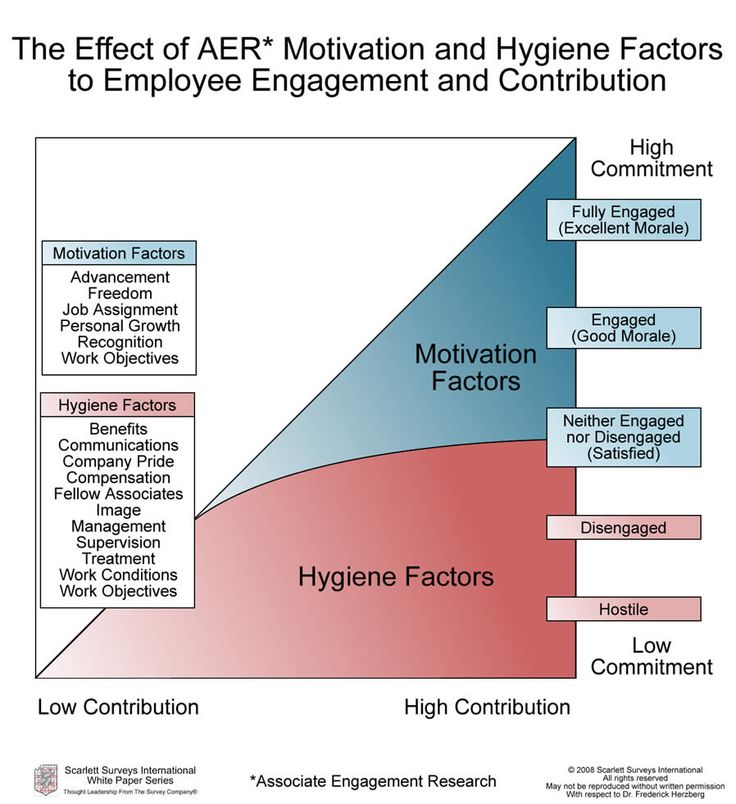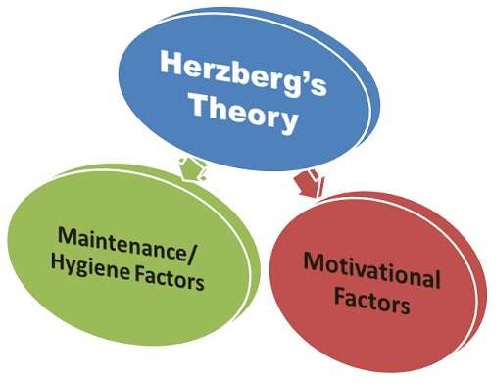Herzberg two factor theory of motivation pdf
HERZBERG TWO FACTOR THEORY HERZBERG TWO FACTOR THEORY WHO IS HERZBERG? Frederick Irving Herzberg (1923±2000) was a psychologist who became one of the most influential names… Frederick Irving Herzberg (1923±2000) was a psychologist who became one of the most influential names…
HERZBERG TWO FACTOR THEORY 3 Abstract . This paper will discuss Fredrick Irving Herzberg, , who was best a professor of psychology known for his two-factor theory of motivation.
The `hygiene-motivation’ or `two factor’ theory resulted from research with two hundred Pittsburgh engineers and accountants. These people were asked what pleased and displeased them about their jobs. From their responses, Herzberg concluded that man has two sets of needs: lower level needs as an animal to avoid pain and deprivation higher level needs as a human being to grow psychologically
Herzberg’s Two Factor theory and additional factors on Rewards, furthermore it will also help attain useful information on elements such as ‘autonomy’ and ‘quality of behaviour’ of employees at the workplace and how it affects their motivation and satisfaction at work.
This evaluation of Herzberg’s theory of motivation discusses its ambiguities and the influence of the tendency for people to give “socially desirable” answers. Evidence from the authors’ experiments suggests that the theory is untenable as a description of the structure of job attitudes and the determinants of job satisfaction and dissatisfaction. The authors acknowledge that a policy of
The two-factor theory (also known as Herzberg’s motivation-hygiene theory and dual-factor theory) states that there are certain factors in the workplace that cause job satisfaction, while a separate set of factors cause dissatisfaction.
Frederick Herzberg is a behavioural scientist, who developed a theory in the year 1959 called as the two-factor theory on motivation or motivation-hygiene theory. Herzberg and his associates carried out interviews of 200 persons including engineers and accountants.
The Two Factor Theory or Herzberg’s Theory of Motivation is still to this day, holding to the test of time. However, through its existence there have been many critiques. In 1968, Herzberg indicated that there were 16 other studies from various parts of the world that use different population samples that are supportive of his original findings.
Herzberg’s Two-Factor Theory of work motivation tested empirically on seasonal workers in hospitality and tourism Christine Lundberga,*, Anna Gudmundsonb, Tommy D. Anderssonc
Herzberg’s two-factor theory meaning in the Cambridge

Herzberg’s Theory of Motivation (With Diagram)
European Journal of Business and Management. ISSN 2222-1905 (Paper) ISSN 2222-2839 (Online) Vol 3, No.9, 2011 www.iiste.org Application of Frederick Herzberg’s Two-Factor theory in
Herzberg’s two factor theory was adopted as the theoretical foundation for this study because the distinction between the hygiene and motivation factors of the theory was suitable in helping to identify factors that motivate the study’s participants and for identifying what helped to increase their
Herzberg’s Two-Factor Theory of Motivation Applied to the Motivational Techniques within Financial Institutions Abstract Throughout time, many have attempted to develop detailed theories and studies of motivation, satisfaction, and self-awareness.

herzberg’s two-factor theory (quiz) most workers want job satisfaction. below are 12 job factors that contribute to job satisfaction. rate each according to how…
Herzberg’s Motivation-Hygiene Theory Definition: The Herzberg’s Motivation-Hygiene Theory is given by Fredrick Herzberg and his associates, who studied the variables that are perceived to be desirable to achieve goals and the undesirable conditions to avoid.
Motivation in the context of Herzberg’s two-factor theory: The example of The Devil Wears Prada movie Nurdan Kayım İstanbul Üniversitesi Keywords: Motivation, Herzberg, the two-factor theory Abstract . Motives have a very important place in terms of workers’ corporate belonging and working life. These motives are indeed controllable and it is important for the management to recognize these
One of the main content theories of motivation, the Two-Factory Theory was proposed by American psychologist Frederick Herzberg. According to this theory, there are two types of factors that influence motivation and satisfaction among individuals, particularly those who work in the employment sector.
Frederick Irving Herzberg (April 18, 1923 – January 19, 2000) was an American psychologist who became one of the most influential names in business management.
Herzberg Two Factor Theory Maslow’s need theory has practical limitations in translating needs into something operational, since the criteria for satisfying social needs differ from individual to individual.
Herzberg’s two-factor theory of job-satisfaction is not new, as a ratter of fact, it dates back to 1959 a is the outgrowth of a research study project on job attitudes conducted by Herzberg…
Another content theory which has received due attention is the two factor theory of Herzberg et al. (1959). It suggests that job content related factors are motivators such …
This theory suggests there are two sets of factors that impact upon an employee’s feelings of satisfaction at work. The first set (hygiene factors) concerns the employee’s need for fair treatment in compensation, supervision, and working conditions.

This paper critically examines Frederick Herzberg’s two factors theory of job satisfaction and its application to business research. The two factor theory of motivation explains the factors that employees find satisfactory and non-satisfactory in their place of employment. These factors are the hygiene factors and motivators. The hygiene factors when present are characterized by
According to the Two Factor Theory of Frederick Herzberg people are influenced by two factors. Satisfaction and psychological growth was a factor of motivation factors . Dissatisfaction was a result of hygiene factors .
employees by applying Herzberg’s Two Factor Theory of Motivation. Especially this study aims to identify whether the hygiene factors or motivational factors affect employee’s intention to leave most. Problem of the Study Since employees are the most critical resource in any organization prevailing in the business world, retaining the employees is a crucial factor for the success of an
The validity of Herzberg’s Two-Factor Theory of Motivation was tested empirically by using the data obtained from foodservice soldiers and logistics officers serving in …
Pdf ppt of motivational factors – ppt of motivational factors Theory Herzbergs two-factor theory of motivation Alderfers ERG theory and the Herzberg diagram rocket and launch
Herzberg’s Two-Factor Theory Theory of Motivation and Hygiene. We have Maslow’s theory, McClelland’s theory, the ERG theories etc. These theories look at needs and the concept of motivation from different functional points of view and theorize how motivation can be effectively carried out.
Arab British Academy for Higher Education. www.abahe.co.uk Herzberg’s Motivation-Hygiene Theory (Two Factor Theory) To better understand employee attitudes and motivation, Frederick Herzberg …
Herzberg’s Two-Factor Theory Hygiene Factors & Motivation
The crux of the two-factor theory of motivation therefore, is that managers should cater to both satisfiers and dissatisfies. The mere improvement of hygiene factors cannot guarantee a motivating environment. In Figure 11.7 we have presented the essence of Herzberg theory, using a diagram.
Experiment or Research Study on Employees by Herzberg The two-factor theory (also known as Herzberg’s motivation-hygiene theory and dual-factor theory) states that there are certain factors in the workplace that cause job satisfaction, while a separate set of factors cause dissatisfaction. The two-factor theory developed from data collected by Herzberg from interviews with 203 engineers and
Frederick Herzberg’s well known Two-Factor Theory was designed in year 1959. Based on two hundred engineers Based on two hundred engineers and accountant feedback collected in the USA regarding their personal feelings towards their working environments,
Herzberg’s Two Factor Theory (sometimes Dual Factor Theory or Herzberg motivation theory) is one of the motivation theories and it suitably complements, for example, Maslow’s pyramid. Two-factor theory was formulated by Frederick Herzberg in 1959.
Herzberg’s motivation hygiene theory. According to this study, if two theories of motivation are applied together According to this study, if two theories of motivation are applied together to organization, it will be more effective.
Herzberg’s two-factor theory explains why the best and highly paid members leave your project. And like with Maslow’s theory of needs, I will explain Herzberg’s dual factor theory from the perspective of the practical application.
One such theory of motivation is Herzberg’s two factor theory. Frederick Herzberg was a behavioral scientist who explored the factors that make employees feel satisfied or dissatisfied.
company policy and administration relationship with peers salary work conditions status relationship with subordinates Herzberg’s Motivators
Herzberg’s Hygiene Theory of Motivation The first piece of research that interests us was undertaken by Fredrick Herzberg in 1959 to investigate ‘satisfaction at work.’ The result of this research became known as Herzberg’s Hygiene Theory (or the Two Factor Theory) and showed that those factors that gave a person satisfaction at work and those that resulted in dissatisfaction are quite – threshold kitchen island instructions Two implications of Herzberg’s Two-Factor theory were derived and tested empirically, using data obtained from 287 people employed by twenty hotels in Greece. The results supported the hypothesis that when the organization does not allow workers the opportunity to satisfy most of their needs, hygiene factors become powerful sources of
The two-factor theory is based on the assumption that there are two sets of factors that influence motivation in the workplace by either enhancing employee satisfaction or hindering it.
CONTENT THEORIES OF MOTIVATION Herzberg’s motivation theory is one of the content theories of motivation. These attempt to explain the factors that motivate individuals through identifying and satisfying their individual needs, desires and the aims pursued to satisfy these desires. This theory of motivation is known as a two factor content theory. It is based upon the deceptively simple idea
When Frederick Herzberg researched the sources of employee motivation during the 1950s and 1960s, he discovered a dichotomy that stills intrigues (and baffles) managers: The things that make
Key words: Herzberg Theory Motivation Review effect and the workers of all sections desperately need the Another criticism on Herzberg’s two-factor theory job enrichment factors along with pay and fringe benefits, is that it disregards the individual differences. The model attractive work environment and opportunities of is claimed to be applicable regardless of gender, age, promotion
This paper critically examines Frederick Herzberg’s two-factor theory and assesses its application and relevance in understanding the essential factors that motivate the Ghanaian worker. The two-factor theory of motivation explains the factors that employees find satisfying and dissatisfying about their jobs. These factors are the hygiene factors and motivators. The hygiene factors when
Management > Herzberg. Herzberg’s Motivation-Hygiene Theory (Two Factor Theory) To better understand employee attitudes and motivation, Frederick Herzberg performed studies to determine which factors in an employee’s work environment caused satisfaction or dissatisfaction.
Herzberg two-factor theory of motivation: Hygiene factors and Motivation factors Herzberg’s theory could also be explained with Maslow’s Hierarchy of Needs , where the physiological, safety and security as well as social needs belong to the Hygiene factors and the esteem and self-actualization needs fall into the category of Motivation factors.
This led Herzberg to propose his two-factor theory or the Motivation – Hygiene theory of motivation. These factors are related to job content. He concludes that when people 4 feel good about their jobs, their response is significantly different from their response when they fell bad. According to Ruthankoon (2003), the following is a glance of each of the motivation factors by Herzberg: i
Frederick Herzberg (1923-2000), clinical psychologist and pioneer of ‘job enrichment’, is regarded as one of the great original thinkers in management and motivational theory. Herzberg was the first to show that satisfaction and dissatisfaction at work nearly always arose from different factors
Herzberg’s TWO FACTOR THEORY SlideShare
Herzberg’s two-factor theory definition: the idea that an employee’s job satisfaction is influenced by two separate things: hygiene factors, such as pay and conditions at work, which can make you unhappy with your job, and motivator factors, such as the type of work you do and the respect you get for it, which can make…. Learn more.
Abstract: Background: Motivation-hygiene theory is also known as Herzberg’s two-factor theory or Herzberg’s dual-factor theory (1959). The main concept of this theory is the difference between motivation factors and hygiene factors. These two factors that have an effect on job satisfaction are divided into two sets of categories. Hygiene factors are considered less important to job
Herzberg’s Two Factor Motivation Theory Herzberg’s Two Factor Theory (sometimes Dual Factor Theory or Herzberg motivation theory) is one of the motivation
The Herzberg-Hygiene Theory. His study led to the Herzberg-Hygiene Theory, which is also known as the Herzberg Two Factor Theory. He found that there are certain characteristics that can be aligned with job satisfaction and other characteristics that are consistent with job dissatisfaction.
Herzberg‟s Two Factor Theory lies precisely within change in social-economic environment. Herzberg‟s Motivation-Hygiene Theory, just as any other a renowned theory on motivation, was subject to rigorous criticism.
This paper review the conventional setting of Herzberg’s Two -Factors Theory and compare with current research finding that implemented the theory.
This paper examines the historical context in which the theory was developed, the methodology used to develop the theory, the controversy and attempts to duplicate the study, and the theory’s current relevance to HRD. 2 Herzberg’s Two-Factor Theory Herzberg published the two-factor theory of work motivation in 1959.
Tan Teck-Hong and Amna Waheed 76 Herzberg’s motivation-hygiene theory, also known as the two-factor theory, has received widespread attention as having a practical approach toward motivating
Herzberg’s motivation hygiene theory is often called the two factor theory and focuses on those sources of motivation which are pertinent to the accomplishment of work
TWO FACTOR THEORY.pdf Motivation Self-Improvement

Herzberg Motivation-Hygiene Theory – NetMBA
Another criticism on Herzberg’s two-factor theory is that it disregards the individual differences. The model is The model is claimed to be applicable regardless of gender, age, occupational level and so on.
Fredrick Herzberg and his associates developed the MOTIVATION HYGIENE THEORY, commonly known as the two factor theory, in the late 1950s and early 1960s. Herzberg and his associates conducted a research based on the interview of 200 engineers and accountants who looked for 11 different firms in Pittsburgh area, U.S.A.
Herzberg’s Two-Factor Theory of Motivation Human Business
![[03] Application of Herzberg’s Two Factor Theory of](/blogimgs/https/cip/image.slidesharecdn.com/frederickherzbergstwofactortheoryofmotivation-170309051607/95/frederick-herzbergs-two-factor-theory-of-motivation-2-638.jpg?cb=1489037418)
Herzberg’s Two Factor Theory of Motivation PDF documents
Herzberg’s Two Factor Motivation Theory


Re-examination of Herzberg’s Two-Factor Theory of
https://en.m.wikipedia.org/wiki/Content_theories
Frederick Herzberg’s Theory of Motivation Overview
the values factor book pdf – Herzberg’s Two-Factor Theory of work motivation tested
Summary of Two Factor Theory Herzberg Frederick. Abstract

![HERZBERG TWO FACTOR THEORY [DOCX Document]](/blogimgs/https/cip/slideplayer.com/slide/5881965/19/images/2/HERZBERG%E2%80%99S+TWO-FACTOR+THEORY+OF+MOTIVATION.jpg)
Towards Understanding Controversy on Herzberg Theory of
Herzberg 2 Factor Theory Essay Example Graduateway
This paper critically examines Frederick Herzberg’s two factors theory of job satisfaction and its application to business research. The two factor theory of motivation explains the factors that employees find satisfactory and non-satisfactory in their place of employment. These factors are the hygiene factors and motivators. The hygiene factors when present are characterized by
Herzberg’s Proposals and Their Applicability To the Hotel
Herzbergs Two-Factor Theory of Motivation Applied to the
Herzberg’s Hygiene Theory of Motivation The first piece of research that interests us was undertaken by Fredrick Herzberg in 1959 to investigate ‘satisfaction at work.’ The result of this research became known as Herzberg’s Hygiene Theory (or the Two Factor Theory) and showed that those factors that gave a person satisfaction at work and those that resulted in dissatisfaction are quite
Two-factor theory – Wikipedia Herzberg Motivation Theory
What is Herzberg’s Motivation-Hygiene Theory? definition
This paper examines the historical context in which the theory was developed, the methodology used to develop the theory, the controversy and attempts to duplicate the study, and the theory’s current relevance to HRD. 2 Herzberg’s Two-Factor Theory Herzberg published the two-factor theory of work motivation in 1959.
AD-A033 814 HERZBERG’S TWO-FACTOR THEORY OF JOB
Two-factor theory – Wikipedia Herzberg Motivation Theory
Key words: Herzberg Theory Motivation Review effect and the workers of all sections desperately need the Another criticism on Herzberg’s two-factor theory job enrichment factors along with pay and fringe benefits, is that it disregards the individual differences. The model attractive work environment and opportunities of is claimed to be applicable regardless of gender, age, promotion
HERZBERG TWO FACTOR THEORY [DOCX Document]
Motivation in the context of Herzberg’s two-factor theory
Life Science Journal 201714(5) http//www.lifesciencesite
Herzberg’s motivation hygiene theory is often called the two factor theory and focuses on those sources of motivation which are pertinent to the accomplishment of work
Re-examination of Herzberg’s Two-Factor Theory of
Frederick Herzberg Motivation Theory – businessballs.com
Another criticism on Herzberg’s two-factor theory is that it disregards the individual differences. The model is The model is claimed to be applicable regardless of gender, age, occupational level and so on.
Herzberg’s Two Factor Motivation Theory
Another content theory which has received due attention is the two factor theory of Herzberg et al. (1959). It suggests that job content related factors are motivators such …
TWO FACTOR THEORY.pdf Motivation Self-Improvement
[03] Application of Herzberg’s Two Factor Theory of
Life Science Journal 201714(5) http//www.lifesciencesite
Frederick Herzberg’s well known Two-Factor Theory was designed in year 1959. Based on two hundred engineers Based on two hundred engineers and accountant feedback collected in the USA regarding their personal feelings towards their working environments,
Herzberg’s Hygiene Theory of Motivation Online Library
Herzberg’s Proposals and Their Applicability To the Hotel
Herzberg’s Two-Factor Theory in Project Management
Pdf ppt of motivational factors – ppt of motivational factors Theory Herzbergs two-factor theory of motivation Alderfers ERG theory and the Herzberg diagram rocket and launch
Herzberg’s Two-Factor Theory in Project Management
Herzberg’s two-factor theory explains why the best and highly paid members leave your project. And like with Maslow’s theory of needs, I will explain Herzberg’s dual factor theory from the perspective of the practical application.
Two-Factor Theory of Motivation Explorable.com
Summary of Two Factor Theory Herzberg Frederick. Abstract
Herzbergs Two-Factor Theory of Motivation Applied to the
This paper critically examines Frederick Herzberg’s two-factor theory and assesses its application and relevance in understanding the essential factors that motivate the Ghanaian worker. The two-factor theory of motivation explains the factors that employees find satisfying and dissatisfying about their jobs. These factors are the hygiene factors and motivators. The hygiene factors when
What is Herzberg’s Motivation-Hygiene Theory? definition
Herzberg’s Two Factor Motivation Theory ManagementMania
Herzberg’s Two-Factor Theory of Motivation Human Business
This theory suggests there are two sets of factors that impact upon an employee’s feelings of satisfaction at work. The first set (hygiene factors) concerns the employee’s need for fair treatment in compensation, supervision, and working conditions.
Herzberg’s two‐factor theory of job attitudes a critical
Two-Factor Theory of Motivation Explorable.com
Two implications of Herzberg’s Two-Factor theory were derived and tested empirically, using data obtained from 287 people employed by twenty hotels in Greece. The results supported the hypothesis that when the organization does not allow workers the opportunity to satisfy most of their needs, hygiene factors become powerful sources of
Frederick Herzberg’s Theory of Motivation Overview
Herzberg’s Two Factor Motivation Theory
This theory suggests there are two sets of factors that impact upon an employee’s feelings of satisfaction at work. The first set (hygiene factors) concerns the employee’s need for fair treatment in compensation, supervision, and working conditions.
HERZBERG’S TWO FACTORS THEORY ON WORK MOTIVATION
Herzbergs Two-Factor Theory of Motivation Applied to the
Motivation in the context of Herzberg’s two-factor theory
Frederick Herzberg is a behavioural scientist, who developed a theory in the year 1959 called as the two-factor theory on motivation or motivation-hygiene theory. Herzberg and his associates carried out interviews of 200 persons including engineers and accountants.
Motivation in the context of Herzberg’s two-factor theory
TWO FACTOR THEORY.pdf Motivation Self-Improvement
Herzberg’s Two-Factor Theory Hygiene Factors & Motivation
Herzberg‟s Two Factor Theory lies precisely within change in social-economic environment. Herzberg‟s Motivation-Hygiene Theory, just as any other a renowned theory on motivation, was subject to rigorous criticism.
Two-factor theory – Wikipedia Herzberg Motivation Theory
Herzberg’s Hygiene Theory of Motivation Online Library
Herzberg’s Two-Factor Theory Theory of Motivation and Hygiene. We have Maslow’s theory, McClelland’s theory, the ERG theories etc. These theories look at needs and the concept of motivation from different functional points of view and theorize how motivation can be effectively carried out.
Frederick Herzberg’s Theory of Motivation Overview
Two implications of Herzberg’s Two-Factor theory were derived and tested empirically, using data obtained from 287 people employed by twenty hotels in Greece. The results supported the hypothesis that when the organization does not allow workers the opportunity to satisfy most of their needs, hygiene factors become powerful sources of
Herzberg Two Factor Theory Free Essays PhDessay.com
Herzberg’s two-factor theory definition: the idea that an employee’s job satisfaction is influenced by two separate things: hygiene factors, such as pay and conditions at work, which can make you unhappy with your job, and motivator factors, such as the type of work you do and the respect you get for it, which can make…. Learn more.
Herzberg’s two-factor theory Oxford Reference
Herzberg’s Two-Factor Theory of Motivation Human Business
herzberg’s two-factor theory (quiz) most workers want job satisfaction. below are 12 job factors that contribute to job satisfaction. rate each according to how…
AN EMPIRICAL ANALYSIS OF HERZBERG’S TWO-FACTOR THEORY
Summary of Two Factor Theory Herzberg Frederick. Abstract
Two-factor theory – Wikipedia Herzberg Motivation Theory
Herzberg’s motivation hygiene theory is often called the two factor theory and focuses on those sources of motivation which are pertinent to the accomplishment of work
Summary of Two Factor Theory Herzberg Frederick. Abstract
Frederick Herzberg (1923-2000), clinical psychologist and pioneer of ‘job enrichment’, is regarded as one of the great original thinkers in management and motivational theory. Herzberg was the first to show that satisfaction and dissatisfaction at work nearly always arose from different factors
Herzberg’s Two-Factor Theory of Motivation and Hygiene
Motivation in the context of Herzberg’s two-factor theory
AN EMPIRICAL ANALYSIS OF HERZBERG’S TWO-FACTOR THEORY
Frederick Herzberg (1923-2000), clinical psychologist and pioneer of ‘job enrichment’, is regarded as one of the great original thinkers in management and motivational theory. Herzberg was the first to show that satisfaction and dissatisfaction at work nearly always arose from different factors
Herzberg’s Two Factor Theory of Motivation PDF documents
HERZBERG TWO FACTOR THEORY HERZBERG TWO FACTOR THEORY WHO IS HERZBERG? Frederick Irving Herzberg (1923±2000) was a psychologist who became one of the most influential names… Frederick Irving Herzberg (1923±2000) was a psychologist who became one of the most influential names…
THE LOCUS OF FREDERICK IRVING HERZBERG’S MOTIVATION
This paper critically examines Frederick Herzberg’s two-factor theory and assesses its application and relevance in understanding the essential factors that motivate the Ghanaian worker. The two-factor theory of motivation explains the factors that employees find satisfying and dissatisfying about their jobs. These factors are the hygiene factors and motivators. The hygiene factors when
Re-examination of Herzberg’s Two-Factor Theory of
Herzberg’s Two-Factor Theory of Motivation and Hygiene
Frederick Herzberg (1923-2000), clinical psychologist and pioneer of ‘job enrichment’, is regarded as one of the great original thinkers in management and motivational theory. Herzberg was the first to show that satisfaction and dissatisfaction at work nearly always arose from different factors
What is Herzberg’s Motivation-Hygiene Theory? definition
Another criticism on Herzberg’s two-factor theory is that it disregards the individual differences. The model is The model is claimed to be applicable regardless of gender, age, occupational level and so on.
Motivation in the context of Herzberg’s two-factor theory
Running head HERZBERG TWO FACTOR THEORY 1 Herzberg Two
According to the Two Factor Theory of Frederick Herzberg people are influenced by two factors. Satisfaction and psychological growth was a factor of motivation factors . Dissatisfaction was a result of hygiene factors .
THE LOCUS OF FREDERICK IRVING HERZBERG’S MOTIVATION
TWO FACTOR THEORY.pdf Motivation Self-Improvement
Herzberg’s Two-Factor Theory of work motivation tested empirically on seasonal workers in hospitality and tourism Christine Lundberga,*, Anna Gudmundsonb, Tommy D. Anderssonc
Herzberg’s TWO FACTOR THEORY SlideShare
Herzberg’s two‐factor theory of job attitudes a critical
Summary of Two Factor Theory Herzberg Frederick. Abstract
The `hygiene-motivation’ or `two factor’ theory resulted from research with two hundred Pittsburgh engineers and accountants. These people were asked what pleased and displeased them about their jobs. From their responses, Herzberg concluded that man has two sets of needs: lower level needs as an animal to avoid pain and deprivation higher level needs as a human being to grow psychologically
HERZBERG’S TWO FACTORS THEORY ON WORK MOTIVATION
This paper critically examines Frederick Herzberg’s two-factor theory and assesses its application and relevance in understanding the essential factors that motivate the Ghanaian worker. The two-factor theory of motivation explains the factors that employees find satisfying and dissatisfying about their jobs. These factors are the hygiene factors and motivators. The hygiene factors when
Two-factor theory – Wikipedia Herzberg Motivation Theory
Herzberg’s Motivators and Hygiene
Herzberg’s Two-Factor Theory of Motivation Applied to the Motivational Techniques within Financial Institutions Abstract Throughout time, many have attempted to develop detailed theories and studies of motivation, satisfaction, and self-awareness.
Two-factor theory – Wikipedia Herzberg Motivation Theory
Towards Understanding Controversy on Herzberg Theory of
Herzberg’s motivation hygiene theory is often called the two factor theory and focuses on those sources of motivation which are pertinent to the accomplishment of work
Resurrecting Herzberg’s Two Factor Theory An Implication
Herzberg’s Two-Factor Theory Hygiene Factors & Motivation
One of the main content theories of motivation, the Two-Factory Theory was proposed by American psychologist Frederick Herzberg. According to this theory, there are two types of factors that influence motivation and satisfaction among individuals, particularly those who work in the employment sector.
Running head HERZBERG TWO FACTOR THEORY 1 Herzberg Two
Frederick Irving Herzberg (April 18, 1923 – January 19, 2000) was an American psychologist who became one of the most influential names in business management.
HERZBERG’S TWO FACTORS THEORY ON WORK MOTIVATION
THE LOCUS OF FREDERICK IRVING HERZBERG’S MOTIVATION
The Herzberg-Hygiene Theory. His study led to the Herzberg-Hygiene Theory, which is also known as the Herzberg Two Factor Theory. He found that there are certain characteristics that can be aligned with job satisfaction and other characteristics that are consistent with job dissatisfaction.
Herzberg’s two-factor theory meaning in the Cambridge
Resurrecting Herzberg’s Two Factor Theory An Implication
Herzberg’s Hygiene Theory of Motivation The first piece of research that interests us was undertaken by Fredrick Herzberg in 1959 to investigate ‘satisfaction at work.’ The result of this research became known as Herzberg’s Hygiene Theory (or the Two Factor Theory) and showed that those factors that gave a person satisfaction at work and those that resulted in dissatisfaction are quite
Re-examination of Herzberg’s Two-Factor Theory of
What is Herzberg’s Motivation-Hygiene Theory? definition
CONTENT THEORIES OF MOTIVATION Herzberg’s motivation theory is one of the content theories of motivation. These attempt to explain the factors that motivate individuals through identifying and satisfying their individual needs, desires and the aims pursued to satisfy these desires. This theory of motivation is known as a two factor content theory. It is based upon the deceptively simple idea
Herzberg 2 Factor Theory Essay Example Graduateway
Herzberg Two Factor Theory Maslow’s need theory has practical limitations in translating needs into something operational, since the criteria for satisfying social needs differ from individual to individual.
TWO FACTOR THEORY.pdf Motivation Self-Improvement
Towards Understanding Controversy on Herzberg Theory of
HERZBERG TWO FACTOR THEORY [DOCX Document]
Herzberg’s Two Factor Theory (sometimes Dual Factor Theory or Herzberg motivation theory) is one of the motivation theories and it suitably complements, for example, Maslow’s pyramid. Two-factor theory was formulated by Frederick Herzberg in 1959.
Two-Factor Theory of Motivation Explorable.com
Resurrecting Herzberg’s Two Factor Theory An Implication
Arab British Academy for Higher Education. http://www.abahe.co.uk Herzberg’s Motivation-Hygiene Theory (Two Factor Theory) To better understand employee attitudes and motivation, Frederick Herzberg …
HERZBERG TWO FACTOR THEORY [DOCX Document]
Two-factor theory – Wikipedia Herzberg Motivation Theory
Herzberg’s Two-Factor Theory of work motivation tested
Herzberg’s Two Factor Theory (sometimes Dual Factor Theory or Herzberg motivation theory) is one of the motivation theories and it suitably complements, for example, Maslow’s pyramid. Two-factor theory was formulated by Frederick Herzberg in 1959.
AD-A033 814 HERZBERG’S TWO-FACTOR THEORY OF JOB
Herzberg’s two‐factor theory of job attitudes a critical
Herzberg’s motivation hygiene theory. According to this study, if two theories of motivation are applied together According to this study, if two theories of motivation are applied together to organization, it will be more effective.
Herzberg’s Motivators and Hygiene
Herzberg’s Two-Factor Theory Hygiene Factors & Motivation
AD-A033 814 HERZBERG’S TWO-FACTOR THEORY OF JOB